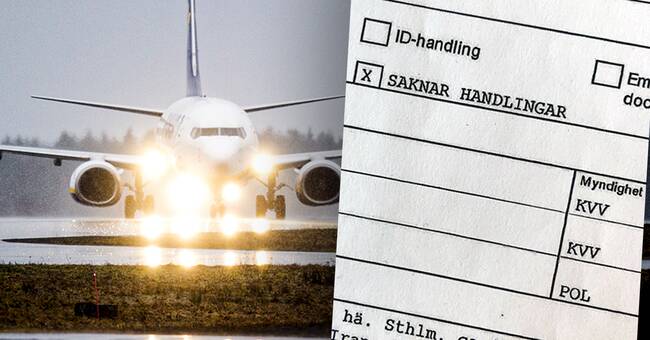Expulsion trips from Sweden are handled by the National Transport Unit within the Swedish Prison and Probation Service, NTE.
Their statistics show that around 2,000 expulsions are made every year with security personnel.
The vast majority of those trips mean that the staff return to Sweden alone, but not all.
Between the years 2016 and 2019, 81 deported persons were returned to Sweden.
Countries sent to include Iran, Morocco, Ghana, Afghanistan, Germany, Jordan, Kenya, Algeria, Sudan, Tanzania, Bangladesh and Libya.
"Can be so that you come back"
- The most common reason is that the recipient country does not receive the person, says Johan Mellbring, head of NTE.
According to Patrik Engström, head of the border police section at the police's national operational department, it may be necessary to carry out deportation trips despite the lack of ID documents, for example.
- Part of the police's work is sometimes to have to travel with a person in order to have to take investigative measures on the spot.
Then it can be the case that you come back, says Patrik Engström.
This is how the journeys can go
At the request of Assignment review, NTE has calculated the cost of the failed expulsions - it is about SEK 16 million.
Documents from the Swedish Prison and Probation Service show how the trips can take place.
• A man is picked up in March 2019 at the prison in Sollentuna to be deported to Ghana.
Three people accompany as security personnel, of which one is a police officer.
Arriving in the capital Accra, the Swedes are informed by the officials on the spot that they "must have much more concrete proof that the client originates from Ghana".
They are urged not to bring anything other than real documents, issued by the Ghanaian embassy, and are allowed to travel back to Sweden where the man is "booked by bus to Karlstad".
• In April 2016, a convicted man will be deported to Morocco by a police officer and an NTE official.
But Moroccan police do not want to receive the man.
The Swedish embassy is involved, but is told that because the deported man does not have a "passport or issued document" from the Moroccan embassy, he can not be accepted.
It takes time and two more NTE officials are flown down to take over.
After a five-day trip, the man and the security staff are back in Sweden.
- When it comes to enforcement of deportation decisions, we have since 2016 started to build up a business with liaison officers in countries where it is particularly difficult to enforce, or where we have special needs, says Patrik Engström at the border police.
“Works with most countries”
Minister of Justice Morgan Johansson (S) believes that the number of people returned to Sweden must be set in proportion to how many deportations you actually succeed with.
- 90 percent of the expulsions to be executed, they are also executed.
It works with most countries, but there are some countries we have had problems with.
Iran is one such country, Iraq is another and so is Lebanon.

